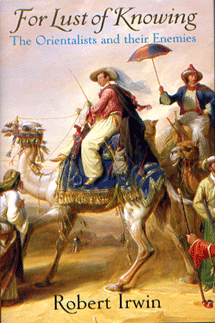
The publisher, author and Arabist historian Robert Irwin recently published a readable and passionate defense of academic Orientalism, a once-respected field that has seemingly been in post-colonial freefall (perhaps more accurately a free-for-all) since Edward Said wrote his seminal polemic Orientalism in 1978. Lust of Knowing (or Dangerous Knowledge: Orientalism and Its Discontents in the American edition), Irwin’s take on the motivation of most past Orientalist scholars, is subtitled “The Orientalists and their Enemies,” a list which extends far beyond Edward Said. “I have done my best to make this book interesting,†(p. 2) begins Irwin and all but the most head-in-the-sand devotees of Said’s thesis would have to agree he is successful in this. Like most readers of Said’s text, which is nearing the three decade mark, Irwin does not set out to defend the bias and prejudice hurled in an Oriental direction from generations of European authors, nor does he disparage Said because he was Palestinian or a staunch defender of Arab causes.
Let Irwin himself explain his motives for writing a book he admits “would not have been written but for Edward Said’s earlier book Orientalism†(p. 3):
“Although some admirers of Said’s book have conceded that it contains many errors and often misrepresents the chaievements of the Orientalists it discusses, they sometimes go on to argue that it deserves praise and attention because of the subsequent debate and research it has provoked. I am not so sure about this. Most of the subsequent debate has taken place within the parameters set out by Edward Said. Much that is certainly central to the history of Orientalism has been quietly excluded by him, while all sorts of extraneous material have been called upon to support an indictment of the integrity and worth of certain scholars. One finds oneself having to discuss not what actually happened in the past, but what Said and his partisans think ought to have happened. Once one has entered the labyrinth of false turns, trompe-l-oeil perspectives and cul-de-sacs, it is quite difficult to think one’s way out again and reflect rationally and dispassionately about the subject. The distortion of the subject matter of Orientalism is so fundamental that to accept its broad framework as something to work with and then correct would be merely to waste one’s time. I have therefore corralled most of my disagreements with Said within a single chapter. This has left me more space to discuss the principal works produced by major Orientalists that were so oddly ignored or disparaged in Orientalism. To set my cards out on the table at this early stage, that book seems to me a work of malignant charlatanry in which it is hard to distinguish honest mistakes from willful misrepresentations. This may seem to my readers to depart from the normal restraint and courtesies of academic debate, but I am afraid that Orientalism led the way in these respects. Said, who died in 2003, was a well-respected figure. In attacking his most important book, I fear that I shall alienate some of my friends: on the other hand I shall certainly also infuriate old enemies and I shall take great pleasure in that. I really am attacking the book rather than the man. I have no significant disagreements with what Said has written about Palestine, Israel, Kipling’s Kim, or Glenn Gould’s piano playing.†(p.4)
Robert Irwin retells the story of a field of scholarly endeavor which he freely admits is “neither very important nor very glamorous – still less actually sinister†(p. 2) but a “bit boring†as most serious scholarship tends to be. But you will not be bored in reading this book, which reveals much about the “lust for knowing†of certain scholars, from certifiable lunatics such as Guillaume Postel (who died in 1581) to anti-imperialist dons like Edward Granville Browne (who died in 1926).
If you have ever read Said’s Orientalism or are planning to do so, you owe it to yourself as well as to the ultimate goal of going beyond the noxious politicized boundary of West vs. East to read Irwin’s book.
I am particularly pleased to draw attention to Irwin’s book, because it is a very different text than my own forthcoming Reading Orientalism: Said and the Unsaid, which is due to appear in November. For your summer reading, I suggest you start with Irwin, then re-read or read Said’s Orientalism and then take a breather until my book is out and complete the trilogy.
[For a review of Irwin’s book by Terry Eagleton, click here].